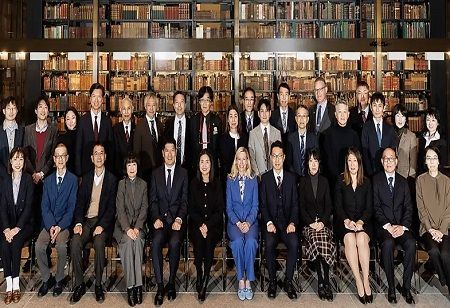Senior leaders from Japan's top four universities - the University of Tokyo, Kyoto University, Tohoku University, and Osaka University as well as members of government of Japan, visited Yale University for the latest session of the Promoting the Evolution of Academia for Knowledge Society (PEAKS) program. Organized by Yale's Office of International Affairs, the program chose this occasion as an opportunity to promote bilateral scholarly and research collaboration between Japanese universities and Yale.
This year, the PEAKS program was also a big deal because it is the first time it will hold a face-to-face meeting since three years of virtual meetings. The program aims to further enhance present collaboration and possibly open new avenues for collaborative research and academic development.
The idea for the program developed over several years, in collaboration with Dr. Takahiro Ueyama, who is a member of the Council for Science, Technology, and Innovation in the government of Japan. The program is one of a suite of leadership programs run by OIA to build and enhance strategic relationships around the world.
During sessions of the program, participants were seated according to their fields of interest and expertise to encourage productive conversations and explore collaborative opportunities. Session topics included: Organizations and Governance of American Research Universities; Liberal Arts and Science Education; Faculty Management and Leadership; University Strategic Financial Planning; Student Entrepreneurship; University Strategies to Promote and Support Innovation; and Research Priorities and Planning.
While visiting Yale’s campus, the program participants toured the Beinecke Rare Book & Manuscript Library and also visited Tsai CITY, the Center for Engineering Innovation and Design, Yale Ventures, the Peabody Museum, and the Yale University Art Gallery. Since its inception in 2021, the program has involved over 200 participants from Japan and engaged more than 35 Yale faculty and staff.
This year’s program included representatives from the national scientific research institute, RIKEN, and 17 Japanese universities; Hiroshima University, Tohoku University, Institute of Science Tokyo, Niigata University, Ritsumeikan Asia Pacific University, Okayama University, Osaka University, Kyushu University, Kyusyu Institute of Technology, Ritsumeikan University, Kyoto University, Tokyo University of Agriculture and Technology, Okinawa Institute of Science and Technology Graduate University, Gifu University, The University of Tokyo, Hokkaido University, and Gunma University.

